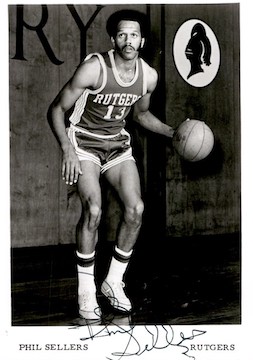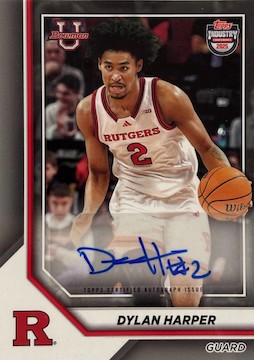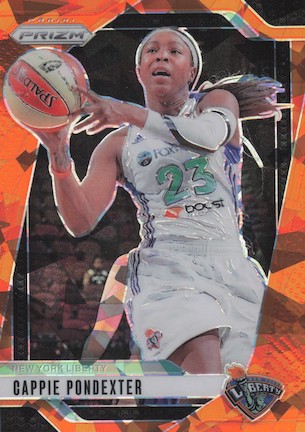
The earliest games of basketball on the Rutgers campus took place in 1906 under the leadership of head coach Frank Gorton. After a couple seasons of losing basketball, Rutgers did not compete again until 1913. In 1915, Frank Hill became the head coach of Rutgers men’s basketball and led the team to a record of 223-162 in his 28 seasons at the helm. Hill’s 28-year tenure as head coach remains the longest in the history of Rutgers men’s basketball. Rutgers’ most notable player during its early years was Ed Benzoni (right), whose 693 career points between 1919 and 1923 remained a school record for 26 years.
After struggling through the ’50s, Rutgers began to improve with the hiring of head coach Bill Foster in 1963. With standout performances by star players Bob Lloyd and Jim Valvano, Rutgers achieved a record of 17-7 in the 1965-1966 season. The next season, Rutgers continued in the right direction by going 22-7, which scored Rutgers a birth in the National Invitation Tournament (NIT), where they finished 3rd. In his sophomore through senior seasons, Bob Lloyd never averaged less than 25 points per game, and currently stands as Rutgers all-time scoring average leader. Lloyd’s number 14 later became the first number retired by Rutgers basketball.

In 1971, assistant coach Dick Lloyd replaced Foster as head coach. With the help of his assistant Dick Vitale, Rutgers was able to land top recruits like Phil Sellers and Mike Dabney. In 1973, Tom Young became head coach. Additions to the team during the next few years saw Eddie Jordan, Hollis Copeland and James Bailey play their home games in Rutgers’ College Avenue Gymnasium. The 1975-1976 season saw Rutgers men’s basketball have the greatest success in its history. An undefeated 26-0 season made Rutgers a national title contender. The talent of the team brought sellout crowds to the College Ave. Gym. When standing room only space was filled to capacity, students would sneak in and sit on the floor with their feet almost over the boundary lines. The Scarlet Knights’ play produced roaring crowds that rocked the arena to the point that paint chips fell from the ceiling. In the 1976 NCAA Tournament, Rutgers advanced to the Final Four in Philadelphia. This was the last Final Four to feature two undefeated teams (Rutgers and Indiana). In the National Semifinals, Rutgers fell to Michigan and then were defeated by UCLA in the third-place game.
Due to the success of the program and the dilapidated state of the College Ave. Gym, Rutgers moved into a new arena in 1977. The Rutgers Athletic Center (RAC), later renamed Louis Brown Athletic Center, has been the home of Rutgers basketball ever since. From 1977-1981, Rutgers was not the only team calling the RAC home, as the New Jersey Nets played in Piscataway until Brendan Byrne Arena was completed.
Amongst men’s basketball players, Eddie Jordan ranks 1st in Rutgers history in steals and assists. His speedy playing style earned him the nickname “Fast Eddie”. Phil Sellers, a tough player who learned to play on both ends of the court growing up in Brooklyn, tops the charts in field goals made, free throws made and rebounds. In his 12 years leading the Scarlet Knights, Tom Young amassed a record of 239-117 with 4 NCAA Tournament appearances. In 1988, Rutgers alum Bob Wenzel rose to the head coaching spot and brought the team to the NCAA Tournament after an Atlantic 10 title-winning season. The Scarlet Knights again earned a berth in the NCAA Tournament in 1991, the last time Rutgers men’s basketball has experienced March Madness to date.
In 1995, Rutgers moved to the Big East Conference. The last moments of success for Rutgers men’s basketball occurred in 2004 when head coach Gary Waters and scoring machine Quincy Douby led the Knights to the NIT final, where they lost to Michigan. Douby would go on to be drafted with the 19th pick of the first round in the 2006 NBA Draft by the Sacramento Kings. The selection was announced by fellow Rutgers alum NBA Commissioner David Stern.
Rutgers had not made headlines since in men’s basketball until a scandal in 2013 involving former head coach Mike Rice. Video surfaced of Rice verbally and physically abusing his players during practice. The incident brought national media to the Rutgers campus and resulted in Rice being fired and athletic director Tim Pernetti resigning. Looking to return to their glory days, Rutgers replaced Rice at head coach with 1976 star Eddie Jordan.

The 2020s saw a revitalization of the men’s program. Ron Harper Jr.—a Don Bosco High School product—and Caleb McConnell led the Scarlet Knights to NCAA Tournament berths in 2021 and 2022. McConnell was named Big Ten Defensive Player of the Year in 2022 and 2023. In 2024, Rutgers boasted one of the nation’s top recruiting classes, including Dylan Harper (Ron’s brother) and Ace Bailey. Although the team struggled through a sub-.500 season, both freshmen distinguished themselves as potential NBA lottery picks.
In the 1970s, Rutgers became coeducational, which led to the emergence of the Rutgers women’s basketball team. In 1974, the Lady Scarlet Knights took the floor for the first time. The 1976 season was historic as Theresa Grentz not only became Rutgers’ first full-time women’s basketball coach, but also the first in the country. 1982 saw Rutgers women win the AIAW National Championship over Texas with Patty Coyle scoring 30 points and winning tournament MVP honors. In 1988, Rutgers all-time scorer Sue Wicks won the Naismith Player of the Year award.
In 1995, C. Vivian Stringer was hired as head coach of Rutgers women’s basketball team. Stringer led the team to numerous upsets and NCAA Tournament appearances. In the 2000 tournament, Stringer became the first coach ever to lead three different schools to the Final Four. In the Final Four, held in Philadelphia, Rutgers fell to Tennessee.

Rutgers women returned to the Final Four again in 2007. In the semifinals, Rutgers blew out LSU to advance to the championship game. However, they once again lost to Tennessee. Headlines were made after the game due to inappropriate comments from radio host Don Imus, who called the Rutgers women “nappy-headed hoes”. The comments became a national story and prompted Al Sharpton to call for Imus’ dismissal. Due to the controversy, Imus’ show was canceled. The Rutgers women’s basketball team and Imus would set up a meeting to clear the air.
Rutgers women’s basketball team has produced many stars and eventual WNBA players including Cappie Pondexter, Essence Carson, Matee Ajavon, Kia Vaughn, Kahleah Copper, Betnijah Laney, Epiphanny Prince and Erica Wheeler. Vivian Stringer was inducted into the Naismith Memorial Basketball Hall of Fame in 2009 as part of a class that also included Michael Jordan, David Robinson and John Stockton.
Stringer retired following the 2021–22 season and was replaced by Coquese Washington, the former Notre Dame star and president of the WNBA Players Association.